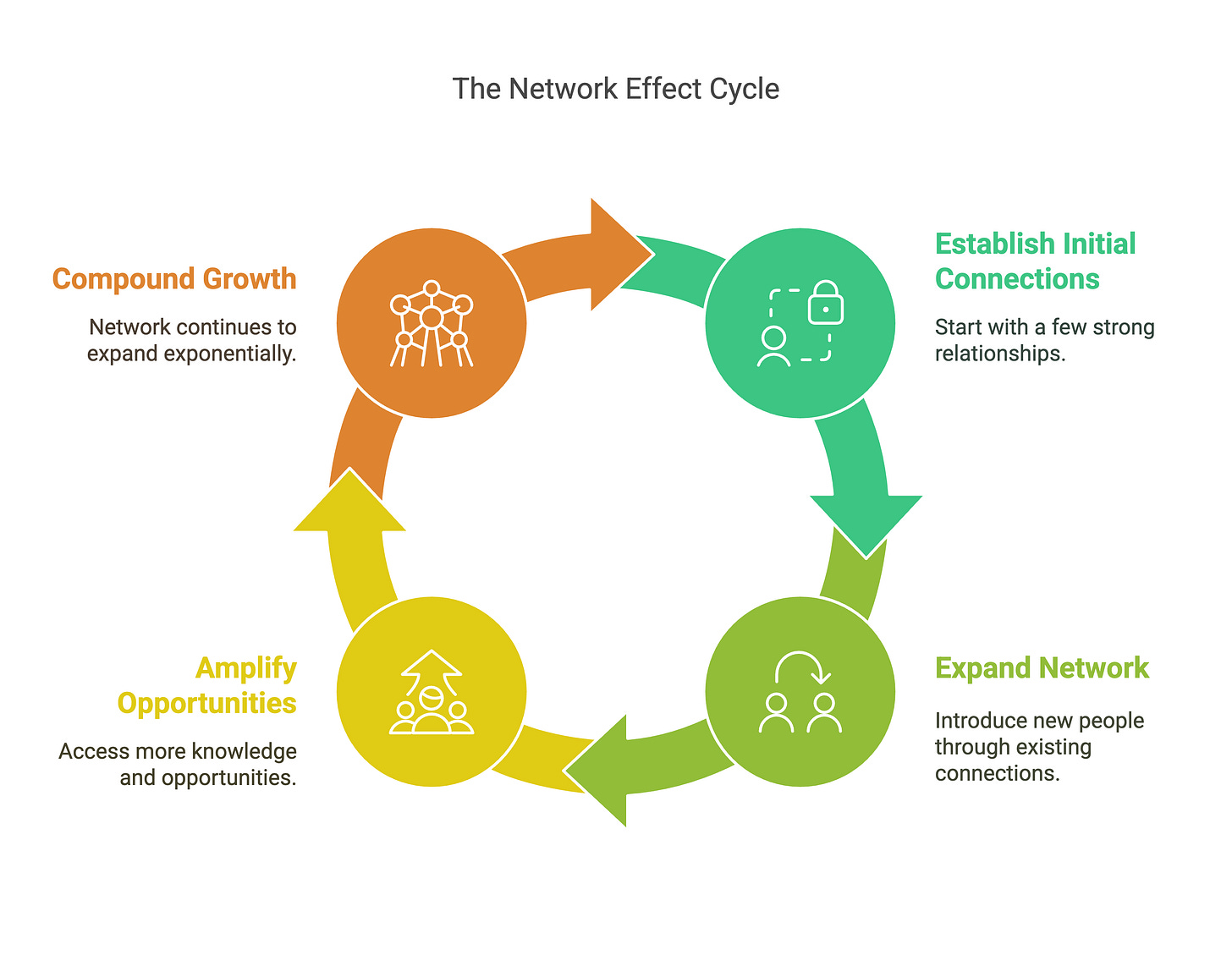You have a problem.
Although you might not even know it.
The problem is that you don’t have a network.
But why do I need a network?
Well it’s pretty simple. A network is a lever. It takes what you know and multiplies it by who you know.
And so the more people you know, the larger the result.
This is the Network Effect.
It describes the phenomenon where a network gets more powerful the more people are part of it.
Think about a social media platform. If only five people are on it, it’s useless. But when millions join, suddenly, it’s a powerful tool.
Your personal network works the same way. The more connections you have, the more knowledge, opportunities, and introductions you can access. And the best part? It compounds over time.
Let’s do some simple math.
Say you start with 5 strong connections—people who genuinely know and trust you. If each of them introduces you to just 2 new people, that’s 10 new connections. If those 10 introduce you to 2 more each, that’s 20 additional people.
5 → 15 → 35 → 75 …
See how quickly that grows? That’s the network effect in action. Each connection you make expands your reach, making future opportunities easier to find.
So how do you actually build this in a way that feels natural (and not forced)?
How to Build a Network.
Now we know that we need a network. How do we build one?
Step 1: Strengthen the Relationships You Already Have
You don’t need to meet hundreds of new people overnight. The easiest way to build a strong network is by starting with the people you already know.
✅ Action Step:
Take 5 minutes today to message someone you haven’t talked to in a while. Ask how they’re doing, comment on something they recently shared, or congratulate them on a career move.
It’s a small step, but small steps add up.
Step 2: Be Active in the Right Places
You need to be where the right people are. But that doesn’t mean endless networking events. The key is strategic presence.
✅ Action Step:
Join LinkedIn groups, Slack communities, or local meetups related to your field.
Comment on posts from industry leaders—share your thoughts, ask questions.
Post your own insights. It doesn’t have to be deep—just share a challenge you overcame or an interesting lesson you learned.
The more you engage, the more people start noticing you.
Step 3: Give Before You Ask
Nobody likes that one person who only reaches out when they need a favour. The secret to strong networking? Give value first.
✅ Action Step:
Share an article or resource with someone who might find it useful.
Offer a quick piece of advice to a junior colleague.
Introduce two people who could help each other.
When you help others, they remember. And when you need help, they’ll be more than happy to return the favour.
Step 4: Diversify Your Network
Most people network only within their own industry. But some of the biggest career breakthroughs come from unexpected places.
✅ Action Step:
Follow professionals in fields outside your own (tech, design, finance, entrepreneurship).
Attend a non-industry event—like an innovation or leadership workshop.
Be curious. When you meet someone in a different field, ask:
“What’s the most interesting part of your job?”
“What’s a challenge in your field that people outside don’t realize?”
You never know what dots you’ll connect in the future.
Step 5: Stay Consistent (Small, Daily Actions Win)
Building a network isn’t about grand gestures—it’s about small, regular actions that compound over time.
✅ Action Step:
Spend 15 minutes a week engaging on LinkedIn (comment, share, message someone).
Set a goal: One meaningful connection per month.
Keep in touch—don’t just reach out when you need something.
Think of it like planting seeds. Some take months (or years) to grow, but when they do, they can change your entire career.
Conclusion: The Network Effect is in Your Hands
Building a strong network isn’t about luck. But it requires intention and consistency. Every relationship you nurture, every thoughtful interaction, and every small action you take adds to the exponential power of your network.
The good news is that you don’t need to be the most connected person in the room to start. You just need to take the first step: reach out, engage, give value, and stay consistent.
Over time, these connections will multiply, opening doors you never even knew existed. That’s the power of the network effect. It’s yours to build.
Our new course, “Running Projects as a Remote Project Manager,” transforms you into a remote project leader.
Learn the skills you won't find in any textbook.
Join the free waitlist by clicking the link above.
See you inside!
Looking to bring all your project management needs under one roof? The Ultimate Project Management Hub for Notion is crafted to help project managers like you simplify the complexity of handling multiple projects, prioritize tasks, and store essential information in one organized workspace.








I think part of the challenge with networking is that for introverts, it doesn’t always come naturally. And the other piece is consistency. You can’t just meet someone once or twice and expect a real relationship to form. You have to keep showing up, without expectations or an agenda. People can sense that kind of thing from a mile away.